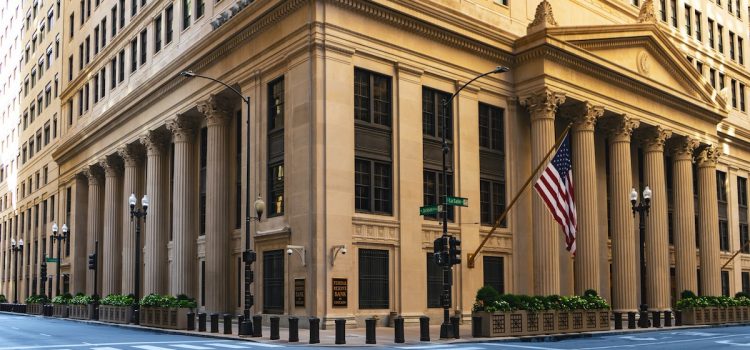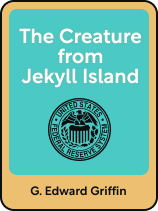

This article is an excerpt from the Shortform book guide to "The Creature from Jekyll Island" by G. Edward Griffin. Shortform has the world's best summaries and analyses of books you should be reading.
Like this article? Sign up for a free trial here.
If we were to abolish the Federal Reserve, how should we go about it? What are some alternatives to the Fed?
Edward Griffin believes the Fed destabilizes the economy and encourages banks to engage in fraudulent practices that harm the public and benefit the elite. In his book, The Creature from Jekyll Island, he identifies four major problems with the Fed and insists that it should be abolished.
Read more to learn Griffin’s proposed two-step strategy to abolish the Federal Reserve.
Abolishing the Federal Reserve
Griffin concedes that simply repealing the law that created the Fed and shutting down the system would be disastrous for the U.S. economy. This is because the economy runs on currency issued by the Fed. If all that currency disappeared, the economy couldn’t function. So, Griffin proposes a sequence of actions that would successfully abolish the Federal Reserve System and correct the problems he identifies.
For one thing, since the Fed facilitates government borrowing, Griffin sees the national debt as a problem that needs to be addressed prior to closing it. He proposes having the Fed issue enough money to buy up all the treasury bonds that it doesn’t already own, effectively paying off the national debt with newly issued money.
Of course, the Fed is also responsible for managing America’s fiat currency, so, before we can abolish the Fed, we need to abandon fiat currency. Griffin proposes phasing out fiat dollars in favor of a new currency backed by precious metals. We’ll call that new currency “precious metal dollars,” or PMDs.
Once fiat dollars are fully phased out, the Fed can be shut down. Without the regulation and safeguards that it provided, some banks will undoubtedly fail. But others will adjust their business practices to manage risk more conservatively, abandoning practices like fractional lending. This shift toward better banking practices among the surviving banks will ultimately make the economy more stable.
| An Alternative Solution: The Bitcoin Standard Cryptocurrency may offer an alternative approach to abolishing the Fed, or at least solving the problems that it creates, according to Griffin. In The Bitcoin Standard, economics professor Saifedean Ammous criticizes fiat currency and the central banks that issue it for many of the same reasons that Griffin criticizes the Federal Reserve, including inflation, wasteful government spending (especially on wars), and artificially low interest rates that destabilize the economy by enticing businesses to borrow money for bad ventures. But, rather than trying to abolish fiat currency by abolishing central banks, Ammous suggests that using bitcoin as an international monetary standard could lead to the abolition of fiat currency through the natural operation of market forces. Bitcoin—and currencies fully backed by bitcoin—wouldn’t suffer from the problems of fiat currency because, as Ammous explains, Bitcoin is impossible for any government to control. This, in turn, is because of its decentralized network structure, which is distributed across many independent parties in many countries. And it’s equally impossible for anyone to arbitrarily issue more bitcoin like governments issue fiat currency, so the supply of bitcoin is stable—much like the supply of precious metals. In Ammous’s solution, the Federal Reserve wouldn’t necessarily need to be abolished. Its power over the economy would be greatly diminished, and some of its functions might become increasingly irrelevant. But it might be able to serve a more useful function by holding a large reserve of bitcoin (similar to its current gold reserves) and buying and selling bitcoin from other central banks to smooth out fluctuations in the demand for bitcoins. Ammous doesn’t address the problem of the national debt explicitly, but if market forces drove the US economy to use primarily bitcoin-backed dollars, the demand for US fiat dollars would decrease, and with it the value of fiat dollars. Because the US national debt is owed in fiat dollars, that would mean the real value of the debt would also diminish, making it easier to pay off and less of a problem in the meantime. |
Exercise: What Would You Do if the Fed Were Abolished?
Imagine that the United States decided to implement Griffin’s plan for abolishing the Federal Reserve. In this exercise, you’ll have a chance to contemplate how that might affect you personally.
- As the Fed pays off the national debt, there’s going to be far more dollars in circulation all at once, causing a sudden surge of inflation, or rather devaluation of the fiat US dollar. What do you think you would do to reduce your vulnerability to inflation or devaluation at that time?
- Once the Fed closes down, no longer regulating banks or insuring deposits, some banks will likely fail, and their depositors will likely lose their savings. How would you manage this risk?
- Now that you’ve had a chance to think through some of the issues involved in implementing Griffin’s plan, do you support or oppose this plan for abolishing the Fed? Why or why not?

———End of Preview———
Like what you just read? Read the rest of the world's best book summary and analysis of G. Edward Griffin's "The Creature from Jekyll Island" at Shortform.
Here's what you'll find in our full The Creature from Jekyll Island summary:
- How the Federal Reserve System destabilizes the economy
- Why banks are encouraged to engage in fraudulent practices that harm the public
- How the Federal Reserve can be abolished






